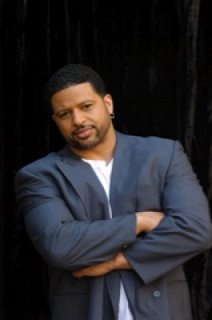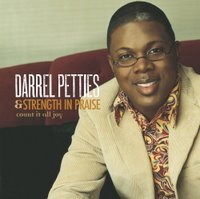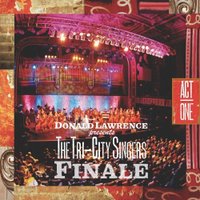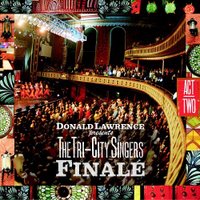
After the Finale
by LaTonya Taylor
The latest album from Donald Lawrence and the Tri-City Singers, Finale, recognizes the end of the choir's award-studded 15-year career. With hits like "Stranger," "When the Saints Go to Worship," "Never Seen the Righteous," and "I Am God," the Tri-City Singers emerged as standard-bearers of the mass choir tradition. Tri-City not only held their own when it came to traditional gospel, but they also blended Lawrence's classical choral influences and R&B impulses with the genre, adding touches of aural and visual dramatic flair for good measure. In this interview, Lawrence talks about how Tri-City came to prominence, the group's legacy and his hopes for the future.
Talk about the decision to end things with the Tri-City Singers.
Donald Lawrence: The cliché is that all good things come to an end, and I think it's better to end at a time when things are at a good place, as opposed to a declining place. We're all growing older, and now many of the members of the choir have their own musical aspirations. Everyone's been very loyal to the choir—in fact, there are a couple of groups and artists who developed through the choir—and it's just the time for everybody to transition into their other careers.
The Tri-City Singers have never had an influx of new people, or a lot of turnover. It's always been all of us or none of us. Now that many of us are moving on, I preferred that we just come together, and, like the Bible says, "they sang their hymn and went home," rather than just turning the remaining members into a brand-new choir. Also, business-wise, it's expensive to travel with choirs, and they're definitely not a low-maintenance choir (chuckle).
It seems like we're in a period where the era of the big mass choir is in decline.
Lawrence: I think choir music is going to be around forever. As a recording artist, I think [the industry] should always record choir songs, but those songs will be mostly on albums as opposed to live performances. Radio-wise, they'll play it to death. It's just that the climate is not right for traveling a choir, moving them around and branding them.
When it comes to live performances, when you can get J Moss by himself, or Mary Mary or Kurt Carr or Martha Munizzi—and some background singers—nobody wants to fly 30 people or 40 people around. People still ask for Tri-City to perform, but sometimes they'll ask me if I can come with six people. My thought is, that's not the Tri-City Singers. That's Donald Lawrence and Company. Tri-City Singers is 30 singers. So, doing a record with 30 singers but traveling with seven people doesn't really make sense to me. But more than anything, I just think that spiritually it's just time for us to transition, time for everybody to get ready to do their thing. That's the number one reason.
You've talked about the end of the Tri-City Singers. How'd things get started?
Lawrence: My time with the Singers actually started while I was on the road. I graduated from Cincinnati Conservatory of Music and toured with Stephanie Mills as her music director. I wrote a lot of choir songs and recorded them on tapes. At that time, a friend of mine directed a community choir called the Tri-City Singers. He was always looking for songs to teach the group, and they sang some of my songs. I knew that I wanted to release a choir album—to do something with all of this music I'd been writing that other artists were interested in. I always told myself that when I got to do a choir album, I wanted to record it with them. My friend left the choir around the same time I was looking to make my own transition and get serious about recording my music.
During that time, the Singers were more of a traditional choir, with robes. They always sang really, really well. I don't know if they were very commercial, but they were always a great group. At that time, they only had 13 or 14 members. I sat with the choir's general manager, Vanessa Durrah, and shared my plan to really establish the group, to rebirth it. I brought in about 15 singers I'd grown up with, and added them to the group. I also wanted us to have a look and a style of our own—to brand ourselves [as different] among the other choirs out there. That's how I came up with the whole ethnic, kind of neo-soul, kind of African look that would be distinctive and fashion-forward—a look to go along with the music. I just kind of came up with that idea, along with the sound, and I wrote the songs, and here we are, 15 years later.
It seems like many Tri-City songs focus on personal encouragement, on looking forward, on reassurance and the character of God. How did those issues become important to you?
Lawrence: That's just who I am. I think Donald Lawrence is a healer; I heal people. I help them look forward and realize that no situation is forever—that it can always get better, that we're destined to be great, because that's why Jesus died for us. He took on poverty, sickness and death so that we wouldn't have it. That's the whole mission of Jesus Christ.
Can you tell a story about a time in your life when that became real to you?
Lawrence: I have plenty of them. I've been in several situations where I've felt alone—I'm out here on this cliff, God, I'm either going to fall and die, or you're going to have to pick me up and give me the energy to move forward. The hardest thing in the world is to struggle through times when you feel like everything is going haywire, yet as an artist you have to encourage people. You have to give people hope when you don't have any. I've just seen God come through for me so many times in that type of situation. He always shows his face, and he shows up in the most impossible of situations.
On the album, you say that gospel was at its best in the 1980s.
Lawrence: That's my favorite time of gospel. I'm not going to say it was at its best, it's just my favorite era. That's because I like the songwriting of that time, I like the heart of the way the music felt. I don't take anything away from our era, but we build on that. So, a lot of times, when you hear us, you do hear a little bit of Thomas Whitfield, and you do hear a little bit of the Thompson Community Choir, and you hear a little of Andrae Crouch, and a little bit of Walter Hawkins, and a little bit of Twinkie Clark. So I definitely pay homage to that era of writers and producers.
You mention that back then, you really had to sing in a live performance.
Lawrence: No gadgets.
Could you talk about that?
Lawrence: Nowadays, if your live performance involves a lot of moving and dancing, you can sing along with a 1680 [a multi-track recorder] using pre-taped vocals, and have it sound just great. That way you can kind of sing—and kind of not. In the '80s, you either had to do it, or you didn't. There were no pre-taped vocals.
My training is in musical theater, where you learn not to let the dancing interfere with your vocal quality. I'm all for 21st century technology, though. In our earlier days, when Tri-City would go into the studio, I loved to experiment with different sounds. Sometimes we'd sing the same song several ways. Sometimes we'd sing eight passes in the studio, sing all of those songs, all the way through, eight times. Now, you can sing one section eight times, and repeat it through the rest of the song.
But back then, with no gadgets, you just had to stand flat-footed and do it. On Finale, we sing "Matthew 28," where you can't use pre-taped vocals because of the way the song is written. That's why I say we're taking it back to the '80s. We had to sing that song all the way through. No gadgets.
Who pushes you to the next level and inspires you?
Lawrence: The people who've inspired me, on the gospel side, were definitely Walter and Edwin Hawkins, and Andrae Crouch, who is definitely one of my favorite songwriters. Also, Richard Smallwood and Twinkie Clark, and I've been strongly influenced by [the late] Thomas Whitfield. One of the great things about this journey is that I didn't know these people early on, when I started. I knew of them, but now we really have grown to be good friends. I've worked with Richard, Edwin, Walter and Twinkie. I've worked with Andrae. I'm really proud to say that we are friends. We stand on each others' shoulders.
You teach at Chicago's Columbia College now. Talk a little bit about your work there.
Lawrence: I teach a class called Urban Inspirational Music. It's a fuse of R&B, hip-hop and gospel. I teach about production and business. I'm trying to help mold the next wave of industry professionals so they understand the basics: publishing, contracts and distribution, anything from getting your business started to understanding how bar codes and Nielsen SoundScan work. Helping people who want to do this become more well rounded rather than just talented.
Are you working on anything else?
Lawrence: I'm also developing my own label imprint, Quiet Water Entertainment, through the Zomba Label Group. I've signed two of the Tri-City Singers, the Murrills, as well as Dewayne Woods. My long-range goal is to develop it into a management company and to do publishing. I'd like to grow as an executive. And I'd love to get back into theater. Theater's the thing that I love and am most passionate about. I'm kind of nonchalant, laid-back, but if you see me in a theatrical mode, that's when you see the light and the fire in my eyes. I've always wanted to do something on Broadway.
What do you see as the legacy of the Tri-City Singers?
Lawrence: That we encouraged. That we always came out to help people to get through life. That's what my music does.






